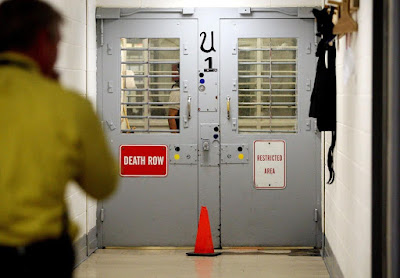Lethal injection only permitted method since death penalty reinstated in 1994
TOPEKA — Attorney General Kris Kobach introduced a bill in the Kansas Legislature allowing the state corrections secretary to decide between intravenous injection of drugs or inhalation of a gas inducing suffocation when executing individuals sentenced to death in state courts.
Kobach has joined other state attorneys general encouraging reliance on hypoxia for executions since Alabama in January became the first state to put to death a convicted murderer by subjecting a man to inhalation of pure nitrogen until dead.
“If Kansas is going to have a death penalty, it needs to be possible to implement,” Kobach said. “Because of difficulties in acquiring the drugs, lethal injection is now limited. I have spoken directly with the attorney general of Alabama, and he confirmed that the hypoxia method worked extremely well.”
Kansas law authorized use of capital punishment for convictions of first-degree murder when certain aggravating circumstances were proven. The state hasn’t executed anyone since 1965. Since reinstatement of the death penalty in Kansas in 1994, lethal injection has been the only permitted method of executing a person incarcerated by the Kansas Department of Corrections.
Under House Bill 2782 introduced formally at the Statehouse by Dan Burrows, chief deputy attorney general to Kobach, the state’s corrections secretary would be required to choose inhalation hypoxia or intravenous injection when carrying out a death sentence.
The legislation would require the option chosen to be administered in a way causing death in a “swift and humane manner” in accordance with the U.S. Constitution. By Dec. 31, 2024, according to the bill, the corrections secretary would establish rules and regulations for carrying out a sentence by hypoxia.
Another provision of the bill would mandate the Kansas Supreme Court notify the district court where the conviction was rendered when all appellate proceedings were resolved. At that point, the district court would be responsible for sending the Department of Corrections a warrant directing the sentence of death to be carried out within 30 days.
Donna Schneweis, chair of the Kansas Coalition Against the Death Penalty, said the method of execution relied upon in Kansas wasn’t the central question.
“The existence of the Kansas death penalty itself is the issue,” Schneweis said. “Kansas continues to waste taxpayer dollars, harm victim families and prison staff, risk the lives of the innocent and violate the morals of many Kansans for a public policy built on vengeance. The time to end the Kansas death penalty is now.”
Kansas courts have found 15 men guilty of capital offenses during the past three decades, but nine remain under a sentence of death. In terms of those nine, capital sentences were imposed between 2002 and 2016. Four of the men placed under a death sentence had their punishment converted to life in prison. Two death row inmates died in prison while their cases were under appeal.
In mid-January, the Kansas Supreme Court affirmed the capital murder conviction and sentence of Kyle Flack, who killed three adults and an infant during 2013 in Franklin County.
That appellate decision included a statement by Supreme Court Justice Caleb Stegall that he was open to considering constitutionality of the Kansas death penalty in terms of whether it was “reasonably related to the furtherance of the common good.”
Alabama executed Kenneth Smith using nitrogen hypoxia, which subjected him to inhalation of the gas through a mask until deceased. The execution was controversial because witnesses said Smith convulsed and gasped for minutes before pronounced dead. In 2022, the Alabama Department of Corrections failed in an attempt to execute Smith by lethal injection because staff couldn’t find a viable vein to insert a needle.
Source:
kansasreflector.com, Tim Carpenter, February 9, 2024
_____________________________________________________________________
SUPPORT DEATH PENALTY NEWS













